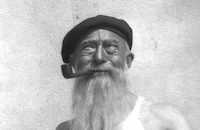Young Bride

Brief Synopsis
Cast & Crew
William Seiter
Helen Twelvetrees
Eric Linden
Arline Judge
Roscoe Ates
Cliff Edwards
Film Details
Technical Specs

Synopsis
While in mourning for her mother, Allie Smith, a shy New York children's librarian, resists joining her rowdy friend Daisy and Daisy's boyfriend Pete on a double date but finally agrees to have dinner with them. At a "chop suey joint," Daisy introduces Allie to Charlie Riggs, a handsome but irresponsible braggart. When Allie refuses to go out alone with him, Charlie becomes morose and, in a drunken state, spends the night with Maizie, a taxi dancer. As she is taken with the smooth-talking Charlie, who is always on the verge of making a "big deal," Allie soon overcomes her shyness and joins him on a Hudson River cruise. After a romantic evening on the river, Allie and Charlie return to Allie's apartment, where they are caught kissing by Miss Gordon, Allie's friend and supervisor. Confronted by Miss Gordon, Charlie announces that he and Allie are engaged, and a short time later, the couple marry and take their honeymoon in Atlantic City. There, Charlie runs into his former employer, C. B. Chadwick, a wealthy Wall Street broker, who offers him a thirty-dollar-a-week job as a runner. Ever the braggart, however, Charlie tells Allie that he is about to make a lucrative stock deal with Chadwick. When Charlie confesses later that he lacks the cash to pay the hotel bill, Allie telephones Chadwick for a loan and learns the truth about her husband. Back in New York, Charlie's half-baked business ideas continue to fail, and Allie grows despondent with worry. Then, after he has begun seeing Maizie again, Charlie learns that Allie is pregnant and, filled with shame, sells several dance trophies that he had won with Maizie. With that money, Charlie wins sixty dollars in a crap game, but gives Maizie fifty dollars to enter them in a dance contest that night. Maizie runs off with the money, however, and when Charlie tries to convince Allie that he is solvent, she screams at him for his infidelities and tells him never to return home. While a disillusioned Allie contemplates suicide, Charlie confronts the deceitful Maizie in a speakeasy and instigates a brawl. Beaten, Charlie staggers home and, after swearing that he has changed for the good, begs Allie to forgive him. Convinced of his transformation, a wiser, stronger Allie embraces Charlie.

Director

William Seiter
Cast
Helen Twelvetrees

Eric Linden

Arline Judge

Roscoe Ates

Cliff Edwards
Blanche Frederici
Polly Walters

Edmund Breese
Walter Percival
Allen Fox
Crew
Irving Berlin
Harry Joe Brown
Carroll Clark
Garrett Fort
Joseph Kane
Ed Kelly
Arthur Miller
Jane Murfin
Ralph Murphy
David O. Selznick
John Tribby

Film Details
Technical Specs

Articles
Young Bride -
By Glenn Erickson

Young Bride -
Quotes
Trivia
Notes
This film was shown in the New York metropolitan area as Love Starved and was reviewed by some journals under that title.














